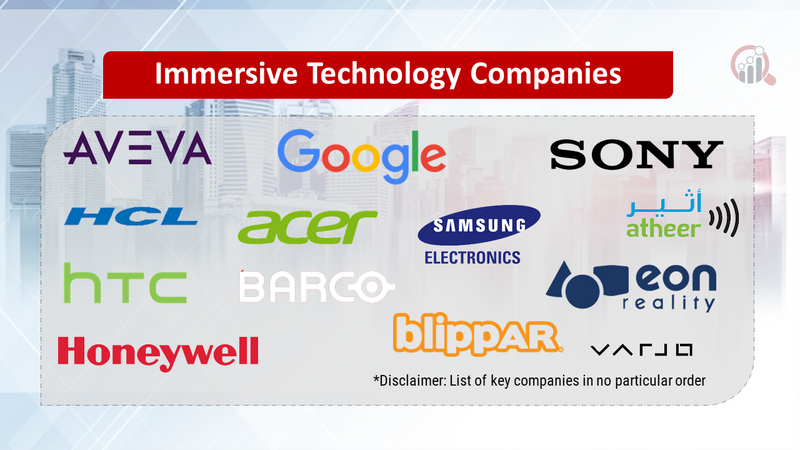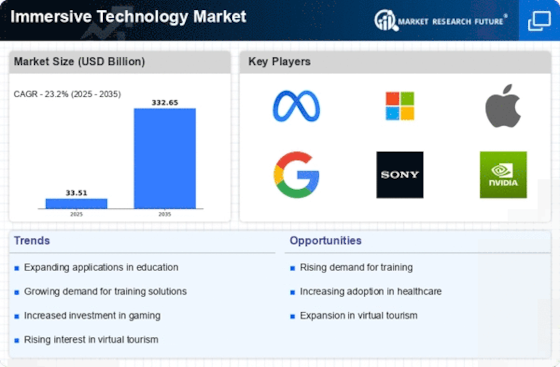Top Industry Leaders in the Immersive Technology Market

Competitive Landscape of Immersive Technology Market:
The immersive technology market, encompassing Virtual Reality (VR), Augmented Reality (AR), and Mixed Reality (MR), is experiencing explosive growth, projected to reach hogh value by 2030. This dynamic landscape attracts diverse players, each vying for a slice of the pie. Let's delve into the key players, their strategies, and market share analysis factors, along with emerging players and current investment trends.
Key Players:
- Acer Inc.
- Atheer, Inc.
- AVEVA Group PLC
- Barco NV
- Blippar Ltd.
- Carl Zeiss AG
- CM Labs Simulations Inc.
- EON Reality Inc.
- FAAC Incorporated
- Google LLC
- Honeywell International Inc.
- HCL Technologies Limited
- HTC Corporation
- Immersive Media Company
- Immersive Technologies Pty Limited
- Lockheed Martin Corporation
- Magic Leap Inc.
- NCTech Limited
- Oculus (Facebook Technologies, LLC.)
- Samsung Group
- Sony Corporation
- Unity Software Inc.
- Varjo Technologies Oy
- VI-grade GmbH
- Zeality Inc.
Market Share Analysis Factors:
-
Hardware & Software Portfolio: Breadth and quality of hardware offerings (headsets, controllers, accessories) and software content (games, applications) play a crucial role. -
Price & Accessibility: Cost of entry and device affordability remain crucial, with budget-friendly options like PlayStation VR and Oculus Go attracting new users. -
Technology & Innovation: Pioneering new features, improved comfort, and seamless integration with existing ecosystems drive differentiation and market penetration. -
Content & Developer Ecosystem: A vibrant library of engaging content across various genres (gaming, education, entertainment) attracts and retains users. Fostering a developer community encourages content creation and platform adoption. -
Target Audience & Applications: Understanding and catering to specific user segments (gamers, professionals, educators) with tailored hardware and software solutions is key.
New and Emerging Companies:
-
Varjo: Finnish company specializing in high-resolution VR headsets targeting professional applications, particularly in simulation and training. -
Lynx VR: Focuses on lightweight, modular VR platforms targeting enterprise and gaming markets with its open-source approach. -
Niantic: Leading AR game developer with popular titles like Pokemon Go, pushing the boundaries of location-based AR experiences. -
Magic Leap One: Second-generation spatial light guide headset aiming to expand consumer and enterprise adoption with improved performance and accessibility.
Current Investment Trends:
-
Enterprise Solutions: Increased focus on VR and AR applications in training, design, collaboration, and remote assistance across various industries. -
Content Development: Investments in immersive content creation tools and studios to cater to diverse user segments and applications. -
Cross-Platform Compatibility: Efforts to enable seamless user experience and content availability across different hardware platforms. -
Haptics & Sensory Feedback: Advancements in haptic gloves, suits, and omnidirectional treadmills to enhance immersion and realism.
Latest Company Updates:
-
Meta acquires VR fitness startup Supernatural for $400 million (Jan 18, 2024): This move signals Meta's commitment to expanding its VR fitness offerings and building a robust metaverse ecosystem. -
Sony unveils new PlayStation VR2 headset with eye tracking and haptic feedback (Jan 4, 2024): The PS VR2 promises a more immersive and interactive gaming experience, set to launch later in 2024. -
Epic Games announces Unreal Engine 5.1 with improved VR development tools (Jan 10, 2024): This update simplifies VR game creation for developers, likely leading to a surge in immersive gaming content.










